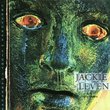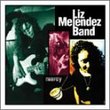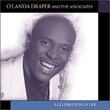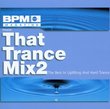| All Artists: William Shimell, Ralph Vaughan Williams, Vernon Handley, Royal Liverpool Philharmonic Orchestra, London Philharmonic Orchestra, Ian Tracey, David Bell, Joan Rodgers, Alison Barlow, Alison Hargan Title: Vaughan Williams: The Nine Symphonies; Job (Box Set) Members Wishing: 0 Total Copies: 0 Label: Class. for Pleas. Us Release Date: 11/6/2002 Album Type: Box set, Import Genre: Classical Styles: Opera & Classical Vocal, Ballets & Dances, Ballets, Forms & Genres, Concertos, Historical Periods, Baroque (c.1600-1750), Modern, 20th, & 21st Century, Instruments, Reeds & Winds, Strings, Symphonies Number of Discs: 7 SwapaCD Credits: 7 UPC: 724357576024 |
Search - William Shimell, Ralph Vaughan Williams, Vernon Handley :: Vaughan Williams: The Nine Symphonies; Job (Box Set)
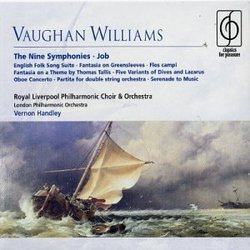 | William Shimell, Ralph Vaughan Williams, Vernon Handley Vaughan Williams: The Nine Symphonies; Job (Box Set) Genre: Classical
|
Larger Image |
CD DetailsSimilar CDs
|
CD ReviewsExcellence throughout Larry VanDeSande | Mason, Michigan United States | 10/15/2004 (5 out of 5 stars) "On balance, this is probably the best set of Vaughan Williams symphonies out there today. Vernon Handley was a protege of Adrian Boult and you can hear a likeness in the way the two approach the music of their countryman. Boult may have had an advantage, being alive at a time Vaughan Williams was composing and premiering a number of the symphonies after they were composed. The passage of time has left us two outstanding sets of Vaughan Williams symphonies by Boult, including a latter stereo version. I have heard both sets and they are wonderful. I prefer this one, however. Handley does things with some of the lesser played Vaughan Williams scores that, I believe, gives him an edge as the best of today's interpreters. His version of the "Sea" Symphony No. 1 -- which is not a favorite of mine -- stacks up with anything out there. It avoids the bombastic approach taken by some conductors that do not completely understand the music or Vaughan Williams style. Even the new Atlanta Symphony version of the "Sea" Symphony does not exceed the vigor, loveliness and fine singing on parade under Handley's baton. Handley also does wonderful things with the lesser known Symphonies 8 and 9, which some critics went wow over when Bernard Haitink recorded them together on one CD a few years back. Personally, I never heard the message of the dramatic 8th Symphony until I listened to this set. Handley is hardly at a loss in the more well-known symphonies, either. His renditions of the "London" Symphony 2, "Pastoral" Sympony 3, Symphony 4 and "Antarctica" Symphony 7 are up with the best versions ever recorded. Handley's version is the first time I ever heard the chimes of Big Ben in the "London" symphony. His trip to Antarctica in Symphony 7 is probably the best one out there today and rivals the famous mono version Boult did 50 years ago, less the spoken tracts at the beginning and between sections. Handley is equally fine in Vaughan Williams two violent symphonies, Nos. 4 and 6. In Symphony 4, he is especially visionary, understanding that the composer was not really writing about the impending world war when he penned the symphony in the late 1930s. Vaughan Williams said it was more about human interaction and communication and you hear this from Handley, who eschews much of the needless violence other conductors put into the score. It is only the Symphony No. 5 where I find a clear preference to versions by Andre Previn in either of his stereo versions. Previn's 1988 Telarc recording also includes "Fantasia on a Theme by Thomas Tallis", perhaps Vaughan Williams' best-known melody. This is preferable to Handley's Symphony 5 diskmate, the "Flos Campi" Suite, which provides another moment for the Liverpool Philharmonic Choir to shine. Previn endows the wonderful symphony with more romance and emotion than Handley. That's not to say Handley's recording is a dog. Hardly! His is an exquisite recording of some of the world's most beautiful music. It lacks little and competes with the best out there. All told, this is a five star set with beautiful and, when appropriate, powerful and visceral playing from the Royal Liverpool Philharmonic Orchestra. There are other fine Vaughan Williams set extant -- both Boult sets, the exceptionally well-recorded Thomson on Chandos, various recordings by Previn & Hickox and those by Bakels on Naxos -- but no complete set quite captures Ralph Vaughan Williams as three dimensionally as this one. My only complaint is Classics for Pleasure could have mated Handley's equally brilliant version of "Job: A Masque for Dancing" with one of the shorter symphonies and did not." RESTORES ONE'S FAITH IN HONEST MUSIC MAKING Klingsor Tristan | Suffolk | 03/29/2007 (5 out of 5 stars) "Thank God for Tod Handley. I vividly recall a year or two back, feeling particularly jaundiced after a succession of glitzy, superficial concerts by conductors far starrier and younger, having my faith in real music making restored by a Handley concert which included a scintillating Schubert Little C Major and a profoundly moving VW Sea Symphony. That work, of course, is the springboard for this cycle of complete VW symphonies. And a very satisfying journey through this inspiring canon of nine it is, too. Handley's affinity with English music needs no reiterating, but his relationship with Vaughan Williams in particular is a special one. More than most, he is alive to the changing and developing nature of the different symphonies through Vaughan Williams life - from the rich Romantic panoply of the 1st, taking in the influence of study with Ravel in the 3rd, the violence of Nos.4 & 6 and the idealisation of his Pilgrim music as well as that of his beloved Tudor composers in the Fifth, right through to the exploration of new sonorities and form in 7, 8 and 9. Throughout the cycle, this is music making that is honest, perceptive, communicative and frequently illuminating and inspiring. Handley's Sea Symphony has terrific sweep in the opening movement, ideal rhythmic crispness in the scherzo and real depth in the long, questing Finale. Its one drawback is perhaps the somewhat cramped acoustics of Liverpool's Philharmonic Hall compared to, say, the fuller sound of the Kingsway Hall in Boult's second recording. His London Symphony is as fine as any, though I do now miss the passages opened out in Hickox's recording of the Original Version. I'm inclined to think this the best Pastoral of any on disc: it finds Handley very sensitive to all the overtones of VW's experiences of the Great War that lie behind its overt pastoralism - Flanders Fields as much as English ones. This is followed by a stunning Fourth, matched only by the composer's own performance. The grinding dissonances of its motto motif, the bounce of the jazzier rhythms, the dark Beethovenian transition to the Finale are all perfectly realised: "I don't know if I like it, but it's what I meant" in VW's famous phrase and I feel sure Handley's performance is just what he meant. The Fifth finds fierce competition from Boult (twice), Barbirolli (twice) and Haitink (most purely symphonic of all). But Handley strikes a fine balance between the Pilgrim's Progress antecedents of much of the material and the `absolute music' arguments to which it is subjected. This disc is almost worth it for the glorious horn counterpoint at the climax of the first movement alone, picked out by Handley as by no other conductor in my experience. His Sixth is another blistering reading to set beside that of his mentor, Boult, in mono for Decca. Handley's pp final movement here is too mystical to be mistaken for the post-nuclear landscape it's often compared to - it seems closer to VW's great friend, Holst's, Neptune. Pacing and colour are the strengths of this Antarctica, but only Haitink really succeeds in making it sound truly symphonic. And No.8 was always the domain of its dedicatee, `Glorious John' Barbirolli, who seemed to have the secret of its somewhat obtuse Variations without a Theme opening movement, its Bartokian Strings only and Wind only inner movements and the clangour of its Finale with `all the phones and spiels know to the composer'. However the elusive 9th is one of the best of Handley's set. He really seems to understand its deep, dark, Hardyesque mysteries, grounded as those novels seem to be in the very earth and land of England, as well as its further explorations of intriguing sonorities with the use of flugelhorn and saxophones. The fill-ups from the original discs are here as well, including a fine Job and a superb Flos campi, another elusive work that seems to speak of secrets that are not to be found in the VW biographies. These are all considerable performances that reflect Handley's long-standing empathy with and authority in this music. And all at a bargain price." Great performances of VW's orchestral glories Robert Burns | Royal Oak, MI USA | 06/07/2008 (5 out of 5 stars) "If you've heard and enjoyed some of Ralph Vaughan Williams' music, but don't want to pay a lot of money collecting his best orchestral stuff, and you also are sure you want crystal clear digital sound - then you owe it to yourself to purchase this incredible box set. You get 7 discs that are jam packed with music (around 70 minutes per disc!), so the 'per disc' price is really quite reasonable. Because each disc is a great value in and of itself, let me review each one:
Disc 1 -- A Sea Symphony (Symphony No. 1). This isn't my favorite work, but the singing and playing is crisp, evocative, and generally exciting. "A Sea Symphony" deserves a brisk approach and clear sound, and you get that. You can picture the flags snapping and the spray of waves! Disc 2 -- A London Symphony (Symphony No. 2); Symphony No. 8. A great coupling, as both of these strike me as his most "British" works. One thing Handley does very well is ensuring that the movements clearly sound as parts of an integrated whole. At first, I wasn't sure I would like the Second, and so I put off listening to it. Probably this was because I'd been exposed to a lackluster recording 10 years ago or so (actually, I think it was Haitink's) and it didn't "grab me". My guess is that you could really botch the first and fourth movements; Handley's vision is exciting. The Eighth seems like it's VW's "Four Temperaments" symphony, yet there's a strand of bitterness, a "seen it all" attitude, running through the whole piece. Handley and the RLPO communicate this well. Disc 3 -- English Folk Song Suite; A Pastoral Symphony (Symphony No. 3); Symphony No. 4. The English Folk Song Suite doesn't seem to have much to say, but if you like it, you'll find it's vivacious and well-played. I have a deep emotional investment in the Pastoral Symphony, however: it was my first Vaughan Williams piece, and it's quite under-rated. Handley's performance is quite celebrated; he never wallows and keeps up quite a steady pace, yet his second and fourth movements do not lack for color or emotion. Because I had been listening to Haitink's version for about 8 years, at first Handley struck me as rushing the piece, but now I'm convinced the two simply are choosing to interpret this masterpiece differently. Haitink's recording is slow but not laborious, thick but not muddled, and overall, I find it a powerful elegy to World War I's fallen soldiers. Handley's version is pastoral and reflective; it has solemn moments but is not excessively burdened by tragedy. Haitink's is for the autumn; Handley's is for the spring. Finally, the Fourth is rightly recognized (by Aaron Copland among others) as an excellent work. The symphony expresses moments of fury, rage, desolation, cynicism, jeering, and downright nastiness. From opening screech to final insult, Handley's tight and driving performance is absolutely top-notch. I seriously doubt I could be persuaded that there is a finer recording anywhere. Disc 4 - Flos campi; Oboe Concerto; Symphony No. 5. "Flos campi" is terribly under-rated, probably because those who are accustomed to like Vaughan Williams (i.e. those who don't mind composers who write tonal pieces post-Schoenberg) are also listeners who are inclined towards older forms such as the sonata, the concerto, etc. Orchestra, choir, and solo choir combine in a work of ravishing beauty - celebrating ravishing beauty (settings of the Bible's Song of Songs). A period of quiet attraction leads to wooing, and while there's hints of a struggle (is Solomon trying to steal the beloved away from her shepherd?), a passionate courtship blossoms forth. The neo-Baroque Oboe Concerto is glorious; the third movement is crowned with a furious buildup to a sublime conclusion. The headliner of this disc is the Fifth Symphony: VW's masterpiece, and a champion recording of it as well. I agree with William Hedley that the first movement is played just a little too loud; it becomes rather loud fairly quickly. All in all, however, this is a recording which continues to keep giving to the faithful listener. The Romanza has to be done right, for it's the heart of the work - and Handley's version is head and shoulders above Slatkin's, Haitink's, and Bakels' versions. This is a powerful rendering of a beautiful and deeply spiritual work. Disc 5 - Symphony No. 6; Symphony No. 9; Fantasia on "Greensleeves". Want to know the feature of this excellent disc that thrills me? It's the coupling. First you hear the E Minor symphonies, a great pair arranged in chronological order, and then as the final chord of the Ninth fades away into the Void, there are a few seconds of silence, and the flute brings in the Fantasia. Depending on your inclination, you can choose to hear the Fantasia as a response to the Ninth's questions regarding the meanings of existence, mortality, and the universe. As such, perhaps the Fantasia is not a direct answer, but a response imbued with hope - a hope that there is indeed a Being whose `mysterious ways' meets us in our human condition, particularly if you hear the lyrics of "What Child Is This?" Anyway, it's simply a stroke of genius to cap off the Sixth and the Ninth with the Fantasia. Wonderfully mystical stuff. As far as the performances go, Handley's Sixth strikes me as a bit lacking in drama. The tempos seem right, but the Moderato just doesn't seem to blast me as it should. The "war" in the movement is conducted dispassionately. By contrast, both Haitink and Slatkin throw themselves into it. The Ninth, on the other hand, is thrilling and the movements are performed with an eye to the unified vision. Handley makes the outer movements sufficiently ruminating and ponderous. Disc 6 - Serenade to Music; Partita for double string orchestra; Symphony No. 7. The Serenade is a glorious, radiant piece of music. Handley has the choral version on this disc. The Partita is a weird, somewhat spooky piece of music. I'm not one to judge string playing, but the lines sound clean and the melody gets through. No complaints. The Seventh is the "Sinfonia Antartica" VW made from his film music. Each movement is faithful to its tempo markings; the Scherzo's penguins are cavorting, and the Lento is truly glacial in its pace. Handley's version is picture perfect. That said, Haitink's re-interpretation is the more compelling symphonic work, because it favors lyricism and an overall musical argument over individual movements' atmospheric tempos and tone colors. I will gladly grant that Haitink re-imagines VW's symphonic work rather liberally, but sometimes (as in this symphony) it works. Handley's version is excellent orthodoxy; Haitink's version is powerful, liberal, and dramatic. I encourage you to own both. Disc 7 - Fantasia on a Theme by Thomas Tallis; 5 Variants on "Dives and Lazarus"; Job. Although I'm not a huge fan of any of these works, I still am not deaf to them. They are perfomed in a most excellent fashion here. These are tight, carefully controlled, and dramatic performances featuring gorgeous string playing. There is no "muddled sound", thank goodness. These pieces demand clarity, definition, and radiance - kudos to performers and engineers. All in all - if you've heard a bit of Vaughan Williams, and you like what you've heard, this is your "one stop" for his best orchestral stuff. I also encourage you to hear Bernard Haitink's versions - compare and contrast. I enjoy having both Handley's and Haitink's VW #3." |

 Track Listings (18) - Disc #1
Track Listings (18) - Disc #1